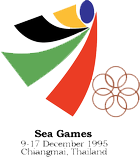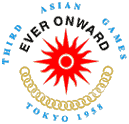
The Bukit Jalil National Stadium in Bukit Jalil, located in the National Sports Complex to the south of the city centre of Malaysia's capital city, Kuala Lumpur, is an all-seater multi-purpose stadium and the home ground of the Malaysian national football team. With a capacity of 87,411, it is the largest in Southeast Asia, third largest in Asia, and the eighth largest football stadium in the world.

The Southeast Asian Games, also known as the SEA Games, is a biennial multi-sport event involving participants from the current 11 countries of Southeast Asia. The games are under the regulation of the Southeast Asian Games Federation with supervision by the International Olympic Committee (IOC) and the Olympic Council of Asia (OCA).

The 2005 Southeast Asian Games, officially known as the 23rd Southeast Asian Games, was a Southeast Asian multi-sport event held in Manila, Philippines.

The 1991 Southeast Asian Games, officially known as the 16th Southeast Asian Games, was a multi-sport event held in Manila, the Philippines from 24 November to 3 December 1991, with 28 sports featured in the games. This was the second time that the country hosted the games and its first since 1981. It was officially opened by President Corazon Aquino at the Rizal Memorial Stadium in Manila through a colorful opening ceremony. It was the only SEA Games at that time where the overall championship was heavily contested. The deciding medal came from the last sporting event - women's marathon where Indonesia got the gold medal.

The 1995 Southeast Asian Games, officially known as the 18th Southeast Asian Games, was a Southeast Asian multi-sport event held in Chiang Mai, Thailand from 9 to 17 December 1995. It was the first time that a non-capital city hosted the biennial sports event. Chiang Mai is the second Thai city to host the Southeast Asian Games after Bangkok. The games were opened and closed by Vajiralongkorn, the then-Crown Prince of Thailand. With the return of Cambodia, all ten members of the federation were present to compete in the SEA Games for the first time.
The 2003 Southeast Asian Games, officially known as the 22nd Southeast Asian Games and also known as Vietnam 2003, was a Southeast Asian multi-sport event held from 5 to 13 December 2003 in Hanoi, Vietnam. This was the first time that Vietnam had staged the SEA Games, and it saw East Timor, which had just gained independence in 2002; although not being an ASEAN member and despite its geographical location closer to the Pacific archipelago than the Asian continent, making its debut at the games.

The 1958 Asian Games, officially the Third Asian Games and commonly known as Tokyo 1958, was a multi-sport event held in Tokyo, Japan, from 24 May to 1 June 1958. It was governed by the Asian Games Federation. A total of 1,820 athletes representing 20 Asian National Olympic Committees (NOCs) participated in the Games. The program featured competitions in 13 different sports encompassing 97 events, including four non-Olympic sports, judo, table tennis, tennis and volleyball. Four of these competition sports – field hockey, table tennis, tennis and volleyball – were introduced for the first time in the Asian Games.

The 1962 Asian Games also known as the 4th Asian Games, IV Asiad, and Jakarta 1962, was the fourth edition of pan-Asian multi-sport event sanctioned by the Asian Games Federation (AGF). The games were held from 24 August to 4 September 1962, in Jakarta, Indonesia. It was the first international multi-sport event hosted by the then-17-year-old Southeast Asian country. This was the first of two Asian Games hosted by the city: the second was held in 2018, with Palembang as the co-host.

The 2009 Southeast Asian Games, officially known as the 25th Southeast Asian Games, was a Southeast Asian multi-sport event hosted by Vientiane, Laos. This was the first time Laos had held the Southeast Asian Games as Laos had previously declined hosting the 1965 Southeast Asian Peninsular Games, citing financial difficulties. This was also the first time the Southeast Asian Games was held in a landlocked country.

The ASEAN Para Games is a biennial multi-sport event held after every Southeast Asian Games involving disabled athletes from the current 11 Southeast Asia countries. Participating athletes have a variety of disabilities ranging from spastic, cerebral palsy, mobility disabilities, visual disabilities, amputated to intellectual disabilities. The ASEAN Para Games is under the regulation of the ASEAN Para Sports Federation (APSF) with supervision by the International Paralympic Committee (IPC) and the Asian Paralympic Committee and is traditionally hosted by the country where the Southeast Asian Games took place.

The 2013 Southeast Asian Games, officially known as the 27th Southeast Asian Games, or the 27th SEA Games, and commonly known as Naypyitaw 2013, was a Southeast Asian multi-sport event took place in Nay Pyi Taw, Myanmar from 11 to 22 December 2013, Around 4730 athletes from 11 participating nations competed at the games, which featured 460 events in 34 sports. The games were held from 11 to 22 December 2013.

The Indonesia national under-23 football team is considered to be the feeder team for the Indonesia national football team, represents Indonesia at football in the Olympic Games, Asian Games and Southeast Asian Games, as well as any other under-23 international football tournaments including the AFC U-23 Asian Cup. It is controlled by the Football Association of Indonesia.
Badminton is a Southeast Asian Games event and has been one of the sports held at the Games since the inaugural edition of the South East Asian Peninsular Games in 1959.
Football has been part of the Southeast Asian Games sport since the 1959 edition. The women's football competition was held for the first time in 1985 in Thailand.
ASEAN School Games (ASG) is an annual games for secondary schools student athletes in the Association of Southeast Asian Nations (ASEAN) and organised under the authority of the ASEAN Schools Sports Council (ASSC). The ASSC is an apolitical regional sports council that promotes sports among member countries. Prior to 2009, the games were played based on satellite, single sports events. This was changed in 2009, where a games format was implemented. The 1st ASG planned under the new games format was hosted by Thailand in 2009, while the 2nd, 3rd and 4th ASG were hosted by Malaysia, Singapore and Indonesia, respectively.

The 2015 Southeast Asian Games, officially known as the 28th Southeast Asian Games, or the 28th SEA Games, and commonly known as Singapore 2015, was a Southeast Asian multi-sport event held by the city-state of Singapore from 5 to 16 June 2015, It was the fourth time the country hosted the games. Singapore previously also hosted the games in 1973, 1983 and 1993 edition.

The 2019 Southeast Asian Games, officially known as the 30th Southeast Asian Games, or the 30th SEA Games, and commonly known as Philippines 2019, was the 30th edition of the Southeast Asian Games, a biennial regional multi-sport event which was held in the Philippines from 30 November to 11 December 2019. However, due to a narrow calendar, some sports started before the opening ceremony as early as November 24.

The 2021 Southeast Asian Games, officially known as the 31st Southeast Asian Games, or the 31st SEA Games and also known as Vietnam 2021, was the 31st edition of the Southeast Asian Games, the biennial regional multi-sport event which was held in Hanoi, Vietnam and its surrounding cities from 12 to 23 May 2022.

The 2023 Southeast Asian Games, commonly known as the 32nd Southeast Asian Games, or the 32nd SEA Games, and commonly known as Cambodia 2023, will be the 32nd edition of the Southeast Asian Games, a biennial sports multi-sport event which will be held from 5 to 17 May 2023 in Phnom Penh, Cambodia.

The Philippines first sent athletes to the Southeast Asian Games in 1977. Prior to 1977, the Southeast Asian Games were known as the Southeast Asian Peninsular Games. The country has hosted the games four times; in 1981, 1991, 2005, and 2019. The country's best finish at the games happened twice, both of them which they hosted: in 2005 finishing as overall champions of the games with Thailand and Vietnam finishing second and third in the overall medal standings. and in 2019 in which they beat their own 2005 medal record. Their best finish in the games, excluding editions hosted by the Philippines, was at the 1983 edition where they finish second behind Indonesia.
















